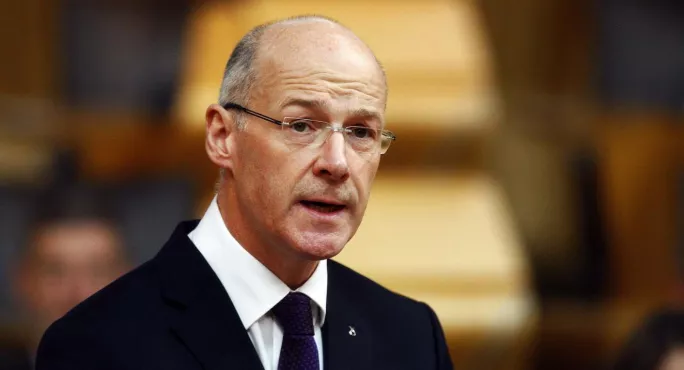- Home
- Education Bill is ‘put out of its misery’
Education Bill is ‘put out of its misery’

After the pause button was pressed a year ago, it has been announced this afternoon that long-awaited legislation designed to give more powers to schools in Scotland will not be revived.
Education secretary and deputy first minister John Swinney cited, for example, “ever-sharper focus” and “real improvements” in closing the “poverty-related attainment gap” through schemes such as the Pupil Equity Fund and the Scottish Attainment Challenge.
But Scottish Conservative education spokeswoman Liz Smith said Mr Swinney had presented “no hard facts whatsoever” to back up his assertion that so much progress had been made that legislation was no longer needed, challenging him to tell MSPs “exactly what evidence he has found that nobody else has found”.
This time last year: ‘Scotland’s Education Bill is shelved’
Closing the gap? Scotland lacks the data to know
National assessments: Testing of five-year-olds should continue, review says
Mr Swinney argued that more decision-making powers than ever are now in the hands of schools due to a “landmark agreement” reached with councils last year, meaning that an 18-month delay while legislation is passed could be avoided.
The changes he cited included:
-
A “headteachers’ charter” to give schools more power.
-
New devolved school management guidelines for local authorities.
-
More funding and support for “regional improvement collaboratives”.
-
A “comprehensive plan to increase engagement with parents and carers in their children’s education”.
‘Fast-tracking’ education reforms
Mr Swinney also flagged up new career pathways for teachers, “enhanced professional learning” for headteachers, and plans to offer more support for a wider range of education professionals, such as school librarians and college lecturers.
He said: “Fast-tracking our education reforms was intended to give schools and teachers more control, quicker than could be achieved through legislation, and it is clear to me we have achieved this.
“Already we are empowering schools through the Scottish Attainment Challenge and headteachers are seeing real results in closing the poverty-related gap in attainment or wellbeing.”
He added: “We want to continue to build on this progress and ensure headteachers and schools have the autonomy and flexibility to make decisions that affect their learners wherever possible.
“Our work throughout the year, in partnership with local government, teacher representatives and the wider education sector, has already made significant progress and I can confirm as a result of our successful collaborative approach I will not introduce an Education Bill.”
‘Show some humility
Scottish Labour Iain Gray education spokesman said everyone had known for a year that the “flagship” Education Bill “would be put out of its misery”. He told Mr Swinney to show “some humility” rather than “ploughing on with reforms no one wants or needs”.
Mr Gray called on the government to:
- Scrap Scottish National Standardised Assessments for P1s, as demanded by Parliament.
- Restore the Scottish Survey of Literacy and Numeracy and re-enter Scotland into international studies such as Pirls (Progress in International Reading Literacy Study) and Timss (Trends in International Mathematics and Science Study).
- Urgently address teacher recruitment and workload.
- Urgently review and address the reduction in subjects which senior pupils can study.
- Halt the “explosion” of teaching in classes covering three and four different levels.
- Provide local authorities with enough funding to make certain that children who have additional support needs are not left behind.
Scottish Liberal Democrat education spokesman Tavish Scott said: “For the past year, John Swinney has sparred with parents, unions and teachers over everything from national testing of five-year-olds to additional support needs and subject choice. None of this has advanced Scottish education one bit.”
‘A non-legislative route’
Responding to this afternoon’s statement from Mr Swinney, Stephen McCabe, children and young people spokesman for local authorities’ body Cosla, said: “Cosla and the wider local government family have worked closely with the Scottish government and other stakeholders to ensure that we deliver an empowered education system that makes certain all children and young people get the most from their time at school.
“We have also focused on how everyone involved in Scottish education can work to this goal and that includes national and local government, schools, headteachers and teachers, wider support staff, children and young people and parents.”
Mr McCabe added: “We have always been clear that these changes can be achieved by taking a non-legislative route. As such, we very much welcome the fact that the deputy first minister supports and recognises the good progress that has been made and we will continue to take forward the reforms to Scottish education without the need for legislation.”
Register with Tes and you can read two free articles every month plus you'll have access to our range of award-winning newsletters.
Keep reading with our special offer!
You’ve reached your limit of free articles this month.
- Unlimited access to all Tes magazine content
- Save your favourite articles and gift them to your colleagues
- Exclusive subscriber-only stories
- Over 200,000 archived articles
- Unlimited access to all Tes magazine content
- Save your favourite articles and gift them to your colleagues
- Exclusive subscriber-only stories
- Over 200,000 archived articles



